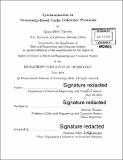Synchronization in timestamp-based cache coherence protocols
Author(s)
Nguyen, Quan Minh (Scientist in electrical engineering and computer science) Massachusetts Institute of Technology
DownloadFull printable version (5.507Mb)
Other Contributors
Massachusetts Institute of Technology. Department of Electrical Engineering and Computer Science.
Advisor
Srinivas Devadas.
Terms of use
Metadata
Show full item recordAbstract
Supporting computationally demanding workloads into the future requires that multiprocessor systems support hundreds or thousands of cores. A cache coherence protocol manages the memory cached by these many cores, but the storage overhead required by existing directory-based protocols to track coherence state scales poorly as the number of cores increases. The Tardis cache coherence protocol uses timestamps to avoid these scalability problems. We build a cycle-level multicore simulator that implements a version of the Tardis protocol that uses release consistency. Changing the coherence protocol, which affects what memory values a processor can observe, changes inter-processor communication and synchronization, two processes crucial to the operation of a multicore system. We construct Tardis versions of synchronization primitives and the atomic instructions they use, and compare them to their analogous implementations on a directory-based cache coherent multicore system. Simulations on several benchmarks suggest that the Tardis system performs just as well as the baseline system while preserving the ability to scale systems to hundreds or thousands of cores.
Description
Thesis: S.M., Massachusetts Institute of Technology, Department of Electrical Engineering and Computer Science, 2016. Cataloged from PDF version of thesis. Includes bibliographical references (pages 85-88).
Date issued
2016Department
Massachusetts Institute of Technology. Department of Electrical Engineering and Computer SciencePublisher
Massachusetts Institute of Technology
Keywords
Electrical Engineering and Computer Science.